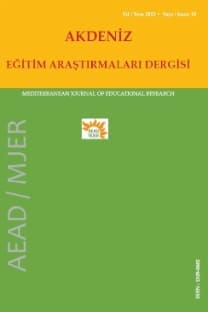In-service science teachers’ astronomy misconceptions
Türkiye’de fen öğretmeni adayları 2010 yılında lisans düzeyinde astronomi dersi almaya başlamışlardır. 2010 yılından önce mezun olan fen öğretmenleri öğretmen yetiştirme programı boyunca herhangi bir astronomi dersi almamışlardır. Ancak, fen eğitimi müfredatı bazı astronomi konularını içermektedir. Fen öğretmenlerinin kavram yanılgıları varsa bu kavram yanılgılarını muhtemelen öğrencilere aktaracaklardır. Bu çalışmanın amacı fen öğretmenlerinin sahip oldukları astronomi kavram yanılgılarını ortaya çıkarmaktır. Çalışmaya daha önce hiç astronomi eğitimi almamış olan 60 fen öğretmeni katılmıştır. Astronomi Kavram Testi veri toplamak için kullanılmıştır. Çalışmanın sonuçlarına göre fen öğretmenlerinin astronomi ile ilgili birçok kavram yanılgısına sahip oldukları tespit edilmiştir. Araştırmanın sonuçları fen öğretmenlerinin fen müfredatındaki astronomi konuları ile ilgili eğitime ihtiyaç duyduklarını ortaya koymuştur.
Fen öğretmenlerinin astronomi kavram yanılgıları
Pre-service science teachers in Turkey began to take undergraduate astronomy course in 2010. Science teachers who graduated before 2010 did not have any astronomy course during teacher preparation program. However, science education curriculum has some astronomy topics. If science teachers hold some misconceptions they will most likely transfer them to their students. The aim of this study was to explore in-service science teachers’ astronomy misconceptions. The participants were 60 in-service science teachers who had no astronomy instruction before. Astronomy Concept Test was used to collect data. Based on the results it is found that in-service science teachers hold several misconceptions related to astronomy. The results of this study show that in-service science teachers need some instructional support about astronomy content to improve their understanding of astronomy related topics in middle school science curriculum.
___
Atwood, V. A., & Atwood, R. K. (1995). Preservice elementary teachers’ conceptions of what causes night and day. School Science and Mathematics, 95, 290.Bektasli (2013). The development of astronomy concept test for determining pre-service science teachers’ misconceptions about astronomy. Education and Science, 38 (168).
Bailey, J. M., & Slater, T. F. (2004). A review of astronomy education research. Astronomy Education Review, 2(2).
Barba, R., & Rubba, P. (1992). A comparison of pre-service and in-service earth and space science teachers’ general mental abilities, content knowledge, and problem solving skills. Journal of Research in Science Teaching, 29, 1021–1035.
Baykul, Y. (2000). Eğitimde ve psikolojide ölçme: Klasik test teorisi ve uygulaması. Ankara: ÖSYM Yayınları, 2000.
Bisard, W., Aron, R., Francek, M., & Nelson, B. (1994). Assessing selected physical science and earth science misconceptions of middle school through university preservice teachers. Journal of College Science Teaching, 24, 38-42.
Brickhouse, N.W., Dagher, Z.R., Letts IV, W.J., & Shipman, H.L. (2000). Diversity of students’ views about evidence, theory, and the interface between science and religion in an astronomy course. Journal of Research in Science Teaching, 37(4), 340-362.
Brunsell, E., & Marcks, J. (2005). Identifying a baseline for teachers’ astronomy content knowledge. Astronomy Education Review, 3(2).
Hannust, T., & Kikas, E., (2007). Children’s knowledge of astronomy and its change in the course of learning. Early Childhood Research Quarterly, 22, 89-104.
Lightman, A., & Sadler, P. (1993). Teacher predictions versus actual student gains. Physics Teacher,31, 162-167.
MEB (Turkish Ministry of National Education) (2006). Science and technology curriculum for elementary science. Retrieved 01 November, 2013, from http://ttkb.meb.gov.tr/www/ogretim-programlari/icerik/72
MEB (Turkish Ministry of National Education) (2013). Science curriculum for grades 3, 4, 5, 6, 7 and 8. Retrieved 01 November, 2013, from http://ttkb.meb.gov.tr/www/guncellenen-ogretim-programlari/icerik/151
National Science Board (2004). Science and engineering indicators. Washington, D.C.: National Science Foundation.
Ozdemir, G., & Clark, B.C. (2007). An overview of conceptual change theories. Eurasia Journal of Mathematics, Science and Technology Education, 3(4), 351-361.
Plummer, J.D., & Zahm, V. M. (2010). Covering the standards: Astronomy teachers’ preparation and beliefs. Astronomy Education Review, 9.
Sewell, A. (2002). Constructivism and students’ misconceptions. Australian Science Teachers’Journal, 48(4), 24-28.
Slater, T. F., Safko, J. L., & Carpenter, J. R. (1999). Long-term attitude sustainability from a constructivist-based astronomy-for-teachers course, Journal of Geoscience Education, 47, 366.
Strike, K.A., & Posner, G.J. (1982). Conceptual change and science teaching. European Journal of Science Education, 4, 231-240.
Trumper, R. (2000). University students’ conceptions of basic astronomy concepts. Physics Education, 35(1).
Trumper. R. (2006). Teaching future teachers basic astronomy concepts-seasonal changes-at a time of reform in science education. Journal of Research in Science Teaching, 43(9), 879-906.
Zeilik, M. (2003), Birth of the Astronomy Diagnostic Test: Prototest Evolution, Astronomy Education Review, 2(1), 46.
Zeilik, M., Schau, C., & Mattern, N. (1998). Misconceptions and their change in university-level astronomy courses. The Physics Teacher, 36.
Zeilik, M., Schau, C., Mattern, N., Hall, S., Teague, K. W., & Bisard, W. (1997). Conceptual astronomy: A novel model for teaching postsecondary science courses. American Journal of Physics, 65(10), 987- 996.
- ISSN: 1309-0682
- Yayın Aralığı: Yılda 4 Sayı
- Başlangıç: 2008
- Yayıncı: Tayfun Taşbilek
Sayıdaki Diğer Makaleler
İl eğitim denetmenlerinin iş yerinde yalnızlıklarının incelenmesi
ERKAN TABANCALI, MİTHAT KORUMAZ
Kimya eğitiminde bilgisayar sunumlarının etkili kullanımı ile ilgili öğrenci görüşleri ve algıları
Öznur ERDOĞAN, ZEYNEP MERAL TANRIÖĞEN
